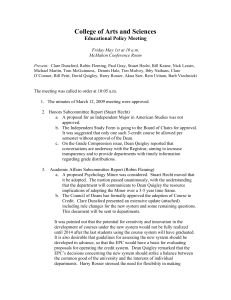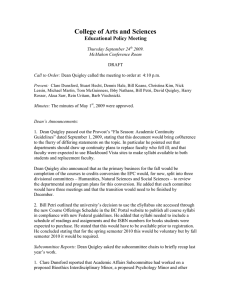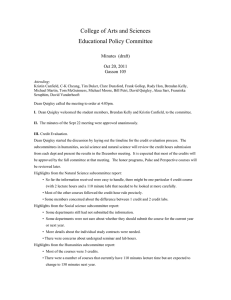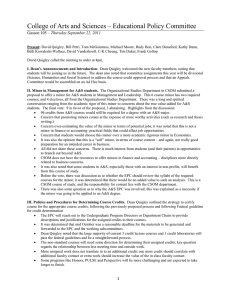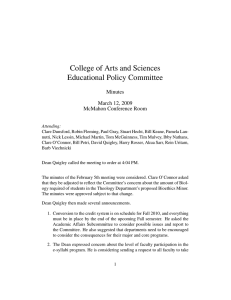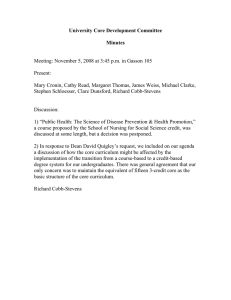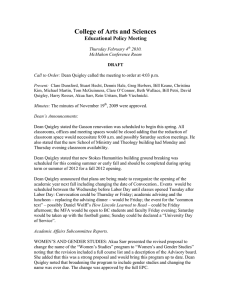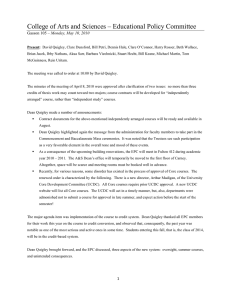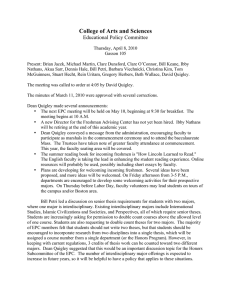Minutes—Educational Policy Committee October 23, 2008
advertisement
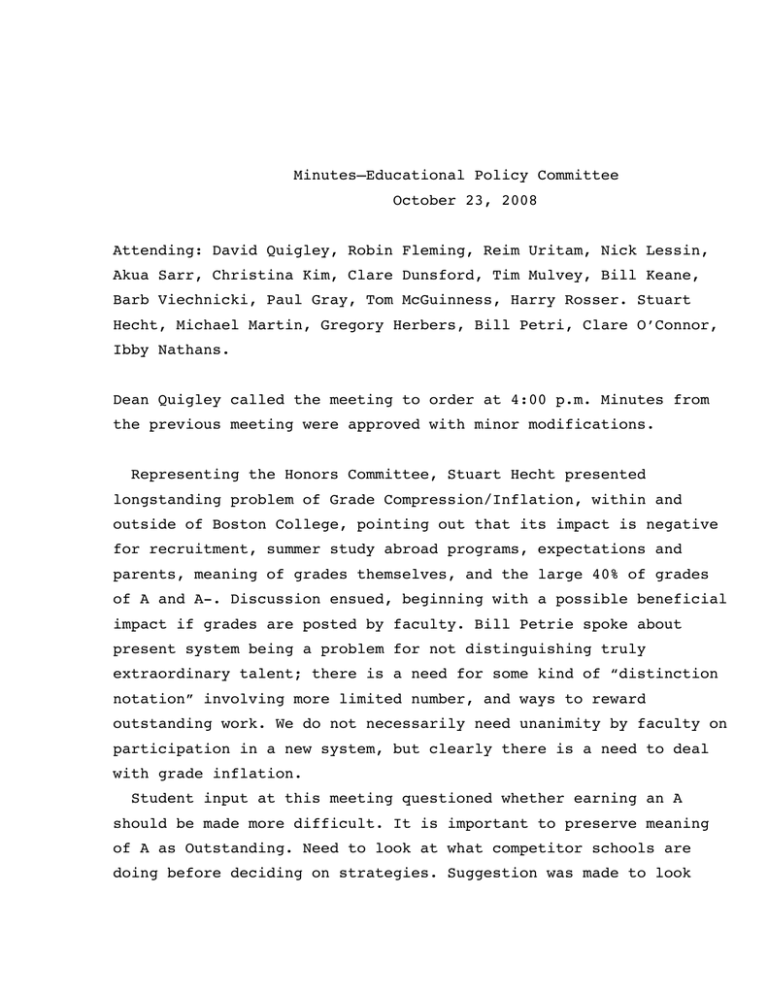
Minutes—Educational Policy Committee October 23, 2008 Attending: David Quigley, Robin Fleming, Reim Uritam, Nick Lessin, Akua Sarr, Christina Kim, Clare Dunsford, Tim Mulvey, Bill Keane, Barb Viechnicki, Paul Gray, Tom McGuinness, Harry Rosser. Stuart Hecht, Michael Martin, Gregory Herbers, Bill Petri, Clare O’Connor, Ibby Nathans. Dean Quigley called the meeting to order at 4:00 p.m. Minutes from the previous meeting were approved with minor modifications. Representing the Honors Committee, Stuart Hecht presented longstanding problem of Grade Compression/Inflation, within and outside of Boston College, pointing out that its impact is negative for recruitment, summer study abroad programs, expectations and parents, meaning of grades themselves, and the large 40% of grades of A and A-. Discussion ensued, beginning with a possible beneficial impact if grades are posted by faculty. Bill Petrie spoke about present system being a problem for not distinguishing truly extraordinary talent; there is a need for some kind of “distinction notation” involving more limited number, and ways to reward outstanding work. We do not necessarily need unanimity by faculty on participation in a new system, but clearly there is a need to deal with grade inflation. Student input at this meeting questioned whether earning an A should be made more difficult. It is important to preserve meaning of A as Outstanding. Need to look at what competitor schools are doing before deciding on strategies. Suggestion was made to look into Princeton University’s system. Harry Rosser suggested we also took at a thorough study done recently at University of North Carolina at Chapel Hill, compiled by UNC Professor Boone Turchi (Economics), a former doctoral student of Bill Neenan at University of Michigan. Harry will obtain a copy of the study for the EPC. Suggestion was made to consult possibly 6 to 8 schools on what their policy is. Stuart then distributed Draft Suggestions for Syllabus/Contract for Individually Arranges, Non-scheduled Courses (See accompanying document). He walked us through some of key suggestions form model of his Theater Department, indicating that this “contract” would have to be modified by individual departments. Discussion of draft was then led by Dean Quigley. Different experiences were described around the table, shedding light on how to adapt the contract to different departments. Also, Rein Uritam raised the need for deciding whether there would be a mandate or voluntary participation. Stuart agreed to bring back a revised version of the draft to help EPC move forward to policy statement but not until we involve more input from departments as well as from more students. Dean Quigley suggested that we aim toward Spring to approve a workable policy, and possibly implement it in the fall of 2009. Moving to the Academic Affairs Committee and the task to draw up a proposal for a new credit system for courses at Boston College, Robin Fleming underscored the need to for sub-committees to discuss the impact of implementing a new system. It is important to have student on the EPC involved in this. She distributed names of people to be assigned to 3 sub-committees and called for thinking about specific points for making a decision. She also handed out a list of 8 questions raising issued to keep in mind in dealing with the whole matter (See accompanying document). Lively discussion ensued about origin of idea and its desirability, need, ramifications, ambiguities, realities, values, advantages, etc. Robin then urged that we have a revisiting or reevaluation of CORE courses before moving into a new credit system. People agreed around the table that this would avoid “putting the cart before the horse”. It was also reiterated that drawing up a proposal for adding a credit to a 3 credit course, as well as parameters for the design of such a course, could be done right as long as we schedule a time frame/calendar. Dean Quigley suggested a possible deadline of one year from now for study/review of the CORE, aiming for a process for credit system change to be applied for the fall of the following academic year, that is, 2009. It is clear that we need a longer vision of where we want to get to before deciding o new credit system, particularly since some colleagues feel the latter is “loaded with bumps and bruises”. to use Stuart’s phrase. We need to exercise some caution, and even some delay in implementation but being sure to put a “time value” on a variety of tasks that we need to undertake to ask the right questions, to deal with a variety of issues and make sure that all departments are on board with a workable plan. In closing, one more big issue arose to keep in mind, and that is how the credit system would affect class size up or down, as well as time required of individual faculty (full-time, part-time, as well as possible new hires?). Claire Dunsford suggested that that newly formed sub-committee members all contact their colleagues and interview them for ideas/thoughts on issues to bring back to smaller working groups. Dean Quigley indicated that he would set a date to return with feedback from our colleagues. The meeting was adjourned at approximately 5:30 p.m. Respectfully submitted, Harry L. Rosser
